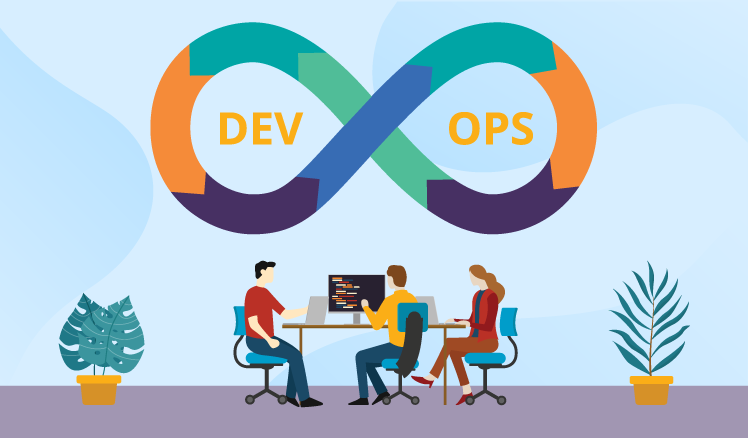How to Build a DevOps Team from Scratch?
Business leaders must understand the importance of DevOps, but building a successful DevOps Team requires a strategic approach.
How to build a DevOps team? A question that innovative organizations already know the answer to but organizations that are just starting off in the DevOps arena will get the answer to the question.
Hiring the class-A Team for DevOps should be the secondary goal, the primary goal must be to devise a
DevOps provides four essential steps that a company must follow:
1. Begin at the right place and right time — that is self-explanatory,
But this phase requires the business to ask three main questions:
• Does it require speed and speed from IT?
• Is management desperate to go faster?
• Are they open to change?
It’s also vital to get the IT team on board and provide the Right tools they will need to be successful in DevOps (effectively becoming the DevOps group). ‘Will they adopt changes and employ DevOps area to the way they operate,’ writes John Jeremiah, evangelist at GitLab?
2. A DevOps series journey.
3. Decide and act — fix historical issues with DevOps.
4. Repeat — do not run before you can walk, and allow time
For this new method of working to install. IT leaders should enable their teams to make the most of this constant improvement that DevOps provides from the enterprise.
How to Build DevOps Teams
1. Discipline and Process
Convinced that a comprehension of the discipline and the procedures are the most important factors when building an effective DevOps team capable of driving DevOps transformation.
“The market perception concentrates on hard skills when hiring People,” he says.
Skills in Jenkins, the golden standard for Continuous Integration or Artifactory, the way to handle binary repository, have a much bigger place in this area than anyone else.
Focus on skills, not on the tools that these professionals will know about when building a DevOps team So when organizations look at hiring individuals, they often look At whether candidates have these skills.
“The most important thing to understand here is that most of These abilities are related across the area,” explains Sanghani. “If you move away from Jenkins today to some other platform, two years later, these abilities continue to be valid.
“When you Consider building out a team which manages DevOps, the focus shouldn’t be on the resources but instead on the understanding a) the discipline b) the processes.”
Tools play a Significant Role, but the processes and how Seamlessly it is set up is more important when considering how to build a DevOps team.
2. Knowing the Speed of Release and Iteration
When constructing a DevOps group, it is also very important to Know the launch velocity and endurance of the organization.
“Having DevOps Men and Women know how quickly the discharge Pace is, know the business demands around it and modulate their procedures around it is just another skill required in any successful DevOps group,” based on Sanghani.
This really is a struggle, because in an organization there Are development groups. Some will probably be purely traditional with waterfall, a few will be pure agile, although there’ll be some that are a part waterfall and part agile — everyone has a different pace.
“Having the ability to create procedures that are effective and Mouldable, in terms of the rate of growth speed, is another big ability to identify within your team,” he continues.
3. Collaboration between Teams
A DevOps team. What can it be? An amalgamation of present From the top, encouraging collaboration between those Departments is necessary when considering how to construct a DevOps team — it’s as much a culture change since it’s technology adoption.
“In any application development process, if you’ve Product managers doing launch planning sessions with the development manager, working with quality assurance to ensure that QA tools are lined up when development finishes their bits, then ensuring that all of the other infrastructure elements are set up, that helps drive achievement,” explains Sanghani.
“DevOps is around collaboration, and Thus getting the mindset Right at the beginning should pay off in the longer term,” confirms James Campanini, general director EMEA at Sumo Logic.
4. Culture and Communication are Important
Development and operations are distinct departments that
Are attempting to be stitched together by forward-looking enterprises. The frequent thread that illuminates these two departments together is DevOps. Included in the whole collaborative nature, DevOps — Especially inside the big Fortune 500 — can help specify the way the release agility should take place in their grade 1 products.
DevOps, increasingly, will define when these products should Get their foundation, when they need to be built, how they need to be sent, how often they need to be integrated.
An advanced, people-first civilization that winners Communication and collaboration has to be adopted by any DevOps team, and indeed the organization generally.
“The Very Best and most Prosperous companies are the Ones That push Their own IT teams to accommodate, and to embrace new IT solutions and versions, for example, DevOps to make that process work for the near future,” says Campanini.
Members of a good DevOps staff Will Have to know what dev, Ops and IT are using since tool-related conclusions across organizations are taken by IT; “should we use Jira or if we use Bugzilla, the monitoring system or should we use Jenkins versus Team City,” asks Sanghani?
5. Don’t Undermine the Importance of Data
The Finest DevOps teams will let the data manual their decisions. Like many technologies and business choices, data plays A vital portion of DevOps.
“For programmers, data from these new applications should Inform them how well their modern services are performing and where improvements can be made,” explains Campanini. And,” for the operations group, it may flag potential problems or identify where extra infrastructure might be needed.”
Alongside monitoring applications, the various data sets can be employed to analyze and provide recommendations on the upcoming steps to be taken in the software development cycle, which”will reap the most benefits for the business, while also enhancing the overall customer experience,” he continues.
“Data is also useful for flagging problems where third Party services are not working to satisfy the necessary service levels and delivering that quality experience for clients.”
According to Campanini, incident management is another area Where DevOps practices can have a major impact.
Plus they have so many different components that if you identify an issue that you want to reach the root cause fast. Using a set of machine information that provides an accurate, real-time overview of what’s happening at scale can help automate some of those incident management measures, which makes it easier for everybody involved to collaborate and to solve issues quicker.”
6. Autonomy
In certain organizations, DevOps teams fold to the primary Engineering organization, which is typically led by the CTO. DevOps is occasionally even folded into surgeries.
Sanghani prefers that DevOps teams maintain their freedom, Because “if you are folding these professionals to either of dev or ops, then you’re in some manner affecting how things occur. Teams have the freedom to succeed and drive change for the company and its clients.
As part of building this team, to be Prosperous, Organisations should focus on the individuals and their abilities, instead of the common resources that technical people are already well-versed in. Are they great communicators? Do they know our company objectives? Can they use the information? Have we, as a business, made a collaborative culture where a DevOps staff can thrive?
If leaders think of these aspects properly and implement a strategy around them then your DevOps team will be all ready to launch the company into success.




